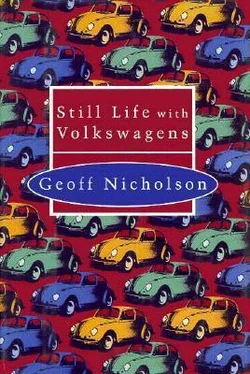He’s sitting alone in a picnic area on the edge of Clumber Park eating a Cornish pastie and a tin of potato salad when he hears the unmistakable sound of approaching Volkswagen engines. They get louder and louder, unnaturally loud, and when he sees eight black Volkswagens weaving towards him through the trees, he knows that something is very wrong indeed.
He is extremely familiar with Ishmael’s Enlightenment. He has even driven it. It was a great car. The eight Beetles he sees before him now appear to be strange, savage parodies of that vehicle. They have the form but not the essence. They park in a V formation not far from where he’s sitting, but it’s a while before any of the drivers get out. The moment one does, Davey knows it is time to get in his van and go. He has no reason to believe that the skinheads driving these Beetles are the same ones who attacked the New Age travellers in the lay-by at the beginning of his travels, certainly he doesn’t recognise any of them, but they still make him feel very uncomfortable. They lurch and tumble out of their cars, shouting and swearing at each other, throwing litter, spraying beer into the air. They look like people adept at finding and creating trouble.
Davey edges towards his van, hoping they haven’t noticed his presence, but it’s too late. They’ve caught sight of him and they’re suddenly very interested. They’re heading towards him and something tells him things will be even worse if he tries to run. He quickly shoves the last of the Cornish pastie into his mouth so as to be ready for the inevitable confrontation.
“Nice van,” says Butcher, who arrives first, a little ahead of his cronies.
“Yes,” Davey says through his full mouth.
“You live in it?”
“Sort of.”
“Like a gypsy or something?”
“Well, a bit,” Davey admits.
“We don’t like gypos,” says Butcher. “We think we’d be better off without them.”
“Yeah,” says another skinhead who has now joined the conversation. “We reckon they’re fuckin’ parasites.”
“Well no, I’m not a real gypsy,” says Davey, swallowing hard. “I’m more of a traveller. I’m more of a tourist actually.”
“Are you really?” asks Butcher.
“Yes, yes I am.”
“Well, let’s put it this way,” says Butcher, “if you were a real gypsy, or a Jewish gypsy or a Paki gypsy or a nigger or a queer gypsy, you’d seriously be in trouble right now. But as it stands, since you’re more of a tourist, you’re only slightly in trouble.”
Davey looks blank. “What am I supposed to have done?” he asks.
Butcher dismisses it as an irrelevant question. “Nothing,” he says. “That’s why we’re not going to knock three kinds of shit out of you.”
“That’s right,” says another. “We’re just going to knock three kinds of shit out of your van.”
“Please, please don’t do that.”
“We won’t be doing too much damage,” says Butcher, “because after all it is a Volkswagen of sorts, but let’s face it, it’s not much of a Volkswagen. It’s just a van. It doesn’t have that authentic Adolf Hitler flavour to it.”
“No, please,” says Davey again. “Why are you doing this?” But even Davey knows that’s a stupid question. They’re doing it because this is what they do. Two of the skinheads grab him, one by each arm, and they keep hold of him while the others get to work on the van.
They use chains and hammers and iron bars and cans of spray paint. They dent and scratch and smash every panel of the van. They spray obscenities all over the back and sides. The headlights are shattered, several windows have cracks like spiders’ webs, engine oil is splashed furiously all over the roof and windscreen. Then the skinheads start rooting around inside the van, turning out the food cupboards, pouring milk, breakfast cereal and instant coffee granules all over the seats and floor, smearing margarine over the dashboard, handbrake and steering wheel.
Davey is forced to watch as his beautiful van is made ugly and wretched. He knows he can’t fight these skinheads. He can’t even break free of the grip of the two holding him. It doesn’t take long for them to completely besmirch his van, at which point, well satisfied, they let him go. He walks towards the wreckage, tears rolling down his cheeks, his body shaking with misery and impotent rage. Butcher observes this and finds it a bit pathetic. “Hey friend,” he shouts, “don’t be a pansy,” and he kicks Davey in the stomach. Davey falls over, and is still there on the ground, still trying to get his breath back, long after the skinheads have departed.
Time passes. Davey’s misery does not, but he knows he can’t stay there forever, so at last he begins very slowly, very painfully to clean up his van. He knows it could have been worse. They could have beaten him to a pulp and set his van on fire for instance, but that isn’t much consolation. The sense of invasion is total but he does what he can. He sweeps up and he wipes down, but the damage requires more than just a bit of cleaning. His pride and joy has been wounded. His van is all fucked up. How’s he ever going to be able to get it back to its previous state of grace? Even a genius like Fat Les would have his work cut out to restore it now.
But oddly enough it’s still drivable. The engine starts and the gears engage and even though it has no lights and is an obscene-looking, graffiti-splattered thing, and even though there’s crud all over the seat and the steering wheel, he eventually drives it away. He doesn’t know where he’s going, but he needs to be somewhere else. As he drives, he knows that other drivers must be looking at him with alarm, and surely it can only be a matter of time before some passing police car spots him, pulls him over and arrests him for being in charge of an unroadworthy vehicle. Maybe that could even be for the best.
Then an extraordinary thing happens. Davey is still shaken, so he’s driving a little slowly and unsurely along a quiet stretch of dual carriageway when he becomes aware of an unusual vehicle closing rapidly from behind him. He expects the vehicle to overtake but instead it slows right down and starts tailgating him.
“Oh God no,” he thinks. “Not more trouble.”
The vehicle is a double-decker bus painted with scenes from the Tarot, and it begins flashing its lights, and the driver waves for Davey to pull over. Davey can see that the driver’s a wild, dangerous-looking character, pierced and tattooed, bare chested, with a top knot and the sides of his head shaved. Strange as it may seem, he looks a little familiar, though Davey can’t quite place the face. Then he realises this is one of the New Age travellers who declined to offer him hospitality. Now, however, the driver looks decidedly friendly, and Davey pulls in at the nearest lay-by. The bus pulls in behind him and Planetary Cliff leaps out.
“Hey! All right!” he shouts to Davey enthusiastically. “What a great looking van.”
Davey looks at him suspiciously, thinking he must be mocking him.
“Yeah,” Planetary Cliff continues. “The moment I saw it I knew you were one of us. Are you on your way to the Gathering of the Tribes? Why not come and join us?”
Davey looks at Planetary Cliff’s rough but open face and sees that he really means it. Once again tears stream down Davey’s face, but this time they’re tears of joy.
♦
The first problem the police have with serial murders is determining what constitutes a series. Boy meets girl, boy gets her in his car, boy takes her to some lonely spot, beats her over the head, strips her, rapes her, mutilates her; so far so commonplace. So far this is an everyday story. The fact that more or less similar events are happening all the time in any number of locations is not enough to suggest that a pattern is taking shape. Before police are prepared to admit that a serial killer is on the loose they want something a little more concrete, more decisive, a particular quirk, an idiosyncratic way of working, the fact perhaps that the murderer has a taste for handcuffs, has a savage way with a speculum, or even perhaps that he drives a Volkswagen Beetle.
Читать дальше












